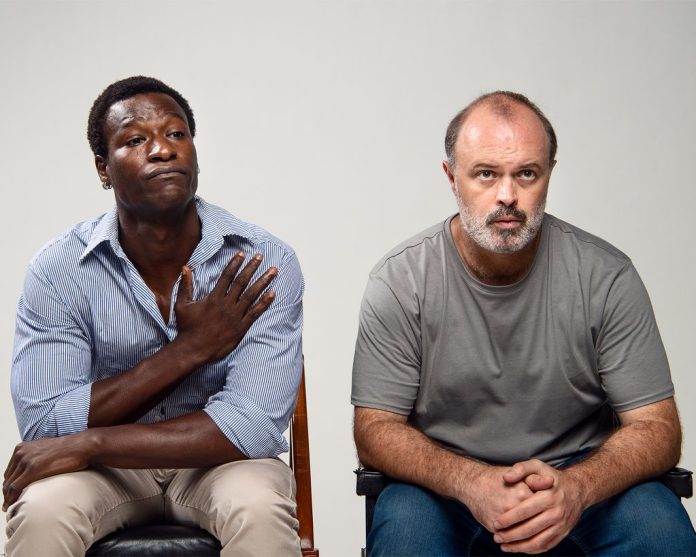A Case for the Existence of God
Writer: Samuel D. Hunter
Director: Craig Baldwin
Seymour Centre
April 11 – May 4, 2024
God doesn’t rate a mention in Samuel D. Hunter’s sensitive and probing A Case for the Existence of God, however faith is rewarded in a low-key and moving way. Faith in what, we ask, or is it simply the hope that things in the end might turn out not to be irredeemably wretched for both characters in this tightly directed absorbing two-hander.
Promised the right to “the pursuit of happiness” Americans live within financial and social systems that not only frustrate the promised pursuit but also censor those who can enter on the quest for fulfillment of their dreams. Ryan (Anthony Gooley) and Keith (Elijah Williams) live in the small town of Twin Falls in the vast emptiness of Idaho, but their hopes and the obstacles to their fulfilment are familiar to many. Ryan, a recently divorced factory hand, has neither sufficient income nor assets to obtain the loan he believes will both recover his patrimony and provide for his daughter, while Keith, gay, black, single and educated, is caught in a child welfare system that privileges reunification with kin. The two very different men connect through their infant daughters who attend the same day care centre.
Keith, a mortgage broker, is a short-term saviour for Ryan as he tries to secure him a loan. The bewildered Ryan’s questions and Keith’s incomprehensible explanations raise a lively and sympathetic reaction in the audience while his conclusion, “And you just hope that everyone else agrees to keep playing by the rules long enough so you have time to grow old and die” elicits a knowing shudder. Ryan, by comparison, attempts to play the role of comforter to Keith after he has prophesied the sad outcome of his foster-daughter’s aunt’s application for reunification.
The men grow closer, a forced intimacy in the beginning, beautifully suggested by the closeness of their physical contact in the cramped cubicle in which their initial meetings take place. The simple device of signifying the passing of time by the buzz of an overheard fluorescent light also indicates the evolution of their relationship. The closed space comes to represent “their shared sadness” as Ryan puts it, and later when an angry Keith breaks open the cubicle it becomes a rebellion against the boxes that must be ticked to make it to the starting line. A well-conceived set (Veronique Benett) the tiny cubicle enveloped in darkness spotlights a single small island of human desperation we know to be replicated over space and time.
We might be reminded of Brecht’s The Caucasian Chalk Circle but we are given little information in this pared down narrative to make the judgement of who would make the better parent. It is suggested that Laura, Ryan’s wife, is ambitious and Ryan is no longer up to her standard, and we know that Willa, Keith’s foster child, was left in his care for two years before the aunt was motivated to “reunify” with her kin. But we have witnessed as movingly portrayed by Gooley and Williams the authenticity of Ryan’s and Keith’s love for Krista and Willa as they watch over their lambs in the playground.
Attention is drawn to the word “harrowing” early in the play and it is impossible to ignore the reference to the “Harrowing of Hell” with its implication of liberation and consider its relevance to the unusual closing scene of this extraordinary play. The case is made or is it?





